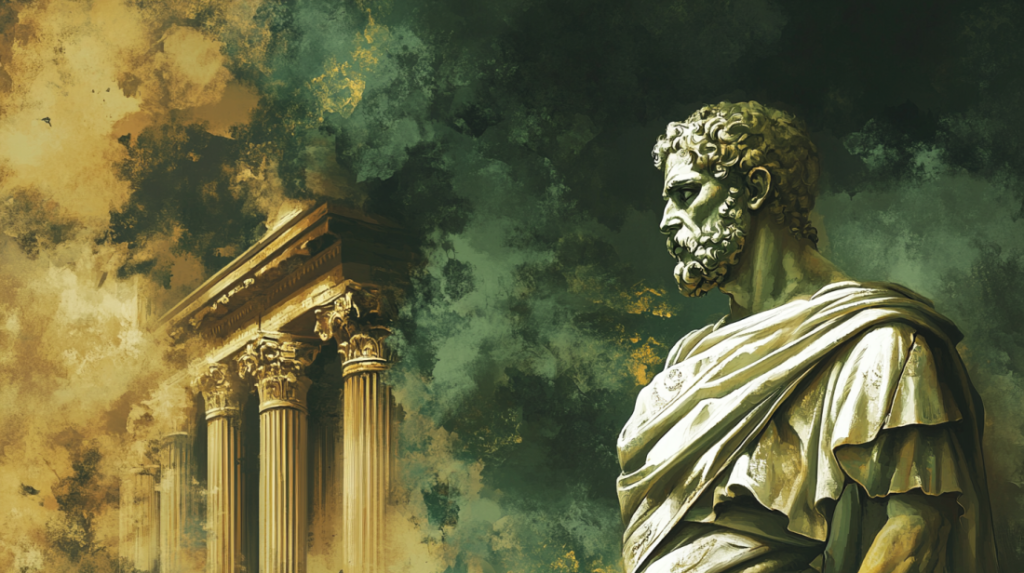Seneca: A Philosopher, Statesman, and Icon of Stoic Thought
Lucius Annaeus Seneca, often referred to simply as Seneca, was a Roman philosopher, statesman, and dramatist whose influence has transcended centuries. Born around 4 BCE in Corduba (modern-day Córdoba, Spain), Seneca’s life was a fascinating blend of intellectual brilliance, political intrigue, and stoic resilience. His works continue to inspire and guide those seeking wisdom, clarity, and purpose.

The Early Life of Seneca
Seneca was born into a wealthy and prominent family in Rome around 4 BCE. His father, Seneca the Elder, was a highly respected rhetorician known for his mastery of oratory. Recognizing his son’s potential, he provided Seneca with a rigorous and comprehensive education that included extensive training in the arts of rhetoric, literature, and philosophy. From a young age, Seneca was immersed in the intellectual currents of his time, allowing him to develop a keen mind and refined literary skills.
Despite facing ongoing health challenges throughout his life, which included severe illnesses that often left him bedridden, Seneca’s intellectual capabilities shone brightly. His experiences with suffering and adversity deepened his understanding of human nature and the complexities of life. It was during this period of reflection that he became profoundly influenced by Stoicism, an ancient philosophy that emphasizes rationality, self-control, and virtue as a means to achieve a good life. This philosophical stance would ultimately shape his writings, his approach to life, and his enduring legacy as one of the foremost Stoic thinkers of his time.
Seneca and Stoicism
Stoicism, founded by Zeno of Citium, emphasizes the importance of virtue, reason, and self-control in achieving a fulfilling life. Seneca’s writings brought these principles to life, offering practical guidance for navigating challenges with grace and composure.
In works like Letters to Lucilius and On the Shortness of Life, Seneca explored themes of mortality, time management, and the pursuit of wisdom. His thoughts on adversity remain particularly resonant:
“Difficulties strengthen the mind, as labor does the body.”
For Seneca, life’s trials were opportunities to cultivate inner strength and clarity.
Political Life and Controversies
Seneca’s career took a political turn when he became a tutor to the young Nero, who later ascended to the Roman throne. As Nero’s advisor, Seneca initially sought to temper the emperor’s excesses, promoting a more measured approach to governance. However, his association with Nero drew criticism, especially as the emperor’s reign became increasingly authoritarian.
Ultimately, Seneca sought to withdraw from political life. Yet, his wealth and influence made him a target, and in 65 CE, he was implicated in a conspiracy to assassinate Nero. Ordered to take his own life, Seneca met his end with stoic composure, embodying the principles he had long espoused.
Seneca’s Legacy
Seneca’s writings have stood the test of time, serving as profound reflections on the intricacies of the human experience. His philosophical essays and letters delve into a range of themes, such as the nature of happiness, the transient quality of life, and the importance of virtue. These works resonate deeply not only with philosophers and scholars but also with leaders, writers, and anyone in search of guidance and clarity in an often chaotic and complex world. Through his exploration of stoicism, Seneca offers valuable insights and practical advice that continue to inspire and challenge readers to navigate their own lives with wisdom and resilience.
Seneca in Modern Culture
Seneca’s name and philosophical ideas have had a lasting impact, inspiring a wide range of fields, from leadership manuals to mindfulness practices. His profound insights into resilience, self-control, and ethical living provide a much-needed counterbalance to the chaos and fast pace of modern life. In an era where distractions abound, Seneca’s call for introspection and virtue encourages individuals to cultivate a deeper sense of purpose and balance.
The reach of Seneca’s influence goes beyond philosophy, extending into the world of art and fashion. For instance, brands like Seneca Jewelry have ingeniously captured his timeless ethos in their creations. They blend historical elegance with contemporary design, creating pieces that not only serve as decorative adornments but also as reminders of the values that Seneca espoused. These artistic interpretations seek to evoke the wisdom of ancient thought while appealing to modern sensibilities, demonstrating that the teachings of the past still resonate powerfully today.
Final Thoughts
Seneca’s life was a testament to the power of thought and reflection in shaping one’s destiny. Whether navigating the corridors of power or penning profound philosophical treatises, Seneca exemplified the ideals of wisdom, courage, and integrity. His words remind us that, no matter our circumstances, we can cultivate an inner peace that transcends external turmoil.
“As is a tale, so is life: not how long it is, but how good it is, is what matters.”
Seneca’s legacy is a beacon of insight and inspiration, urging us all to live with purpose and virtue.



